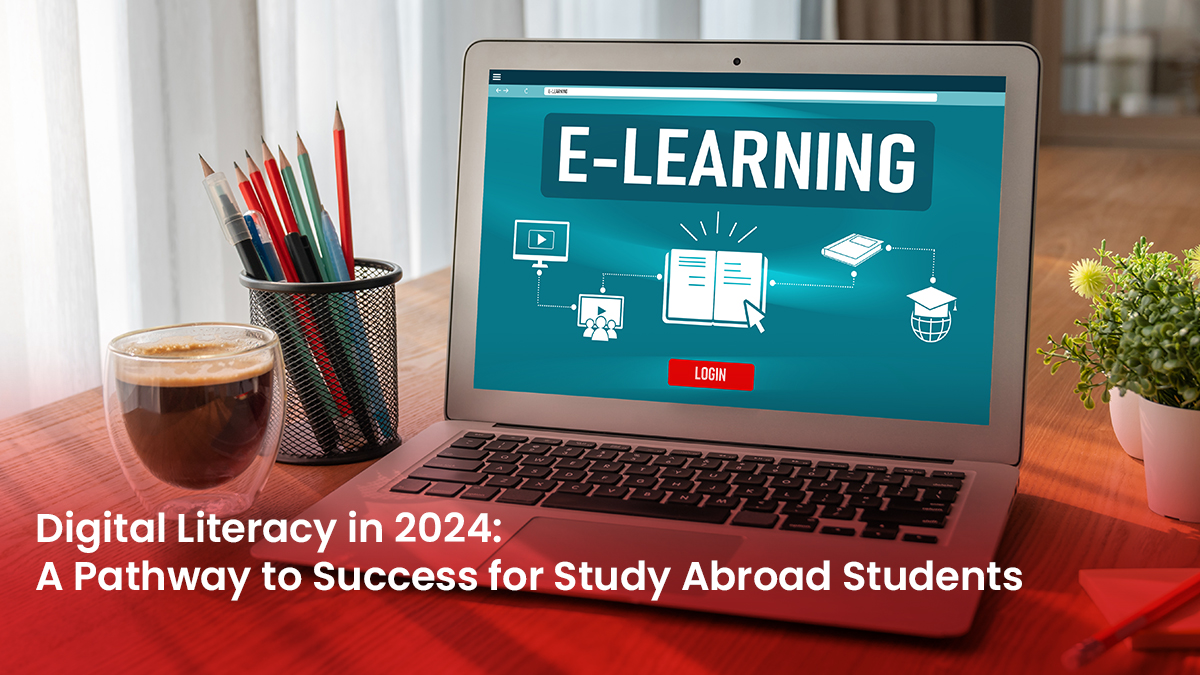International Literacy Day, celebrated annually on September 8th, has long emphasized the importance of reading and writing skills in fostering education and social development. However, in 2024, the focus extends to digital literacy—a critical competency in today’s tech-driven world. As the world becomes increasingly interconnected, the definition of literacy evolves to encompass not just traditional reading and writing but also the ability to navigate digital environments effectively.
With the rise of digital platforms and technologies in education, particularly for international students, digital literacy is no longer optional but a prerequisite for success. It involves more than just using technology; it requires understanding how to find, evaluate, and communicate information effectively in the digital space. In study abroad programs, where students must handle online applications, virtual classrooms, and diverse digital tools, mastering these skills is essential.
As global education becomes increasingly digitized, digital literacy is not just an asset; it is a necessity. For international students, enhancing their digital literacy is key to thriving in study abroad programs. This blog by MSM Unify overseas education consultancy explores the significance of International Literacy Day 2024 and why digital literacy is critical for students aspiring to study abroad.
Relevance of digital literacy while studying abroad
Digital literacy refers to the skills needed to find, evaluate, create, and communicate information via digital platforms. It extends beyond technical abilities, incorporating critical thinking and problem-solving in digital contexts. For international students, digital literacy involves using technology to manage the entire study abroad process—from researching universities to submitting applications, attending virtual lectures, and accessing academic resources.
In the context of studying abroad, digital literacy permeates every stage of the journey. Whether students are selecting universities through online portals, applying for scholarships, or attending virtual classes, these processes rely heavily on digital platforms. For instance, the ability to navigate university websites, understand Learning Management Systems (LMS) and handle online communication tools is crucial for a smooth academic experience.
According to UNESCO, digital literacy has become a cornerstone of modern education, with students needing these skills to adapt to various learning environments, especially when studying in foreign countries.
Key digital literacy skills for international students
1. Navigating online applications
International students need to be proficient in using online portals for submitting documents and tracking applications. Universities often use centralized platforms, and students need to know how to interact with these systems efficiently to avoid missing deadlines or providing incorrect information.
MSM Unify, a platform connecting students with overseas education consultants, offers resources to help students navigate the application process seamlessly.
2. Online research skills
Researching reliable information is a fundamental digital literacy skill. Whether finding universities, applying for scholarships, or understanding visa requirements, students must discern between trustworthy and unreliable online sources. Proficiency in this skill ensures that students make informed decisions about their study abroad journey.
3. Familiarity with educational platforms
Learning Management Systems (LMS) like Moodle, Blackboard, or Google Classroom are widely used in universities. Students must understand how to use these systems to access course materials, submit assignments, and participate in discussions.
Platforms like MSM Unify provide guidance on preparing for such digital tools before departure, enhancing the transition to a new learning environment.
4. Cybersecurity awareness
With the rise of online applications and financial transactions, international students must be aware of cybersecurity risks. Phishing scams, data breaches, and online fraud can threaten personal information during application processes. Students should practice safe online behaviors, such as using strong passwords and verifying websites’ security before making payments or sharing personal information.
The impact of digital literacy on academic success abroad
Access to resources
Digital literacy empowers students to access a wealth of academic resources, including e-libraries, online research databases, and collaborative tools.
This access is especially important for international students, who may not have physical access to all resources and must rely on digital materials for assignments and research.
Global communication
Effective digital communication tools enable students to collaborate with peers and professors across time zones and cultures. These tools help facilitate group projects and academic discussions, which are vital components of many study abroad programs.
Platforms like Zoom and Microsoft Teams are frequently used for remote collaboration, making digital literacy an essential skill for academic success.
Adaptability to digital tools
Digital literacy is not just about mastering one tool but being adaptable to various platforms used by universities worldwide.
For example, one university might use Google Classroom while another relies on proprietary software. Being comfortable with different systems helps students stay adaptable, ensuring they can focus on learning rather than technical issues.
Digital literacy challenges for international students
Tech gaps between countries
Not all countries offer the same level of access to technology or the Internet. International students may come from regions where digital infrastructure is underdeveloped, putting them at a disadvantage.
Universities and platforms like MSM Unify overseas education consultants help bridge this gap by offering resources and preparatory tools to enhance students’ digital readiness before they travel abroad.
Language barriers in technology
Students from non-English-speaking countries might find it challenging to navigate educational platforms and tools that are primarily in English.
This language barrier can be an obstacle when interacting with software or completing online assignments. However, online tutorials, translation tools, and support services can mitigate these challenges.
Cybersecurity threats
International students are particularly vulnerable to cybersecurity risks when accessing global education platforms. Phishing attacks, for instance, are prevalent, and students unfamiliar with these threats might fall victim. Universities need to provide cybersecurity training to international students to protect their data and financial information during their time abroad.
How to improve digital literacy before studying abroad
1. Enroll in online courses
Students can take advantage of free or paid courses that teach digital literacy skills, focusing on tools like Microsoft Office, Google Workspace, and Zoom. These tools are widely used in academia and will help students prepare for the digital aspects of their study abroad experience. MSM Unify can help you access resources, workshops, and courses to improve your digital skills.
2. Stay updated on educational technology
With the rapid evolution of educational technology, students need to keep themselves updated on the latest virtual learning environments (VLEs), AI-powered platforms, and interactive learning tools. Staying informed about these innovations ensures that students remain competitive and adaptable during their studies.
3. Practice with online resources
Whether through webinars, digital journals, or podcasts, students should practice using various online resources to improve their digital literacy. Engaging with these tools before departure allows students to familiarize themselves with the types of digital platforms they’ll encounter abroad.
Conclusion
Digital literacy is a key enabler of success for international students pursuing education abroad. From navigating online applications to thriving in virtual classrooms, students who are digitally literate have a significant advantage.
So, let’s recognize the expanding role of digital literacy in shaping the future of education. For students preparing to study abroad, now is the time to enhance your digital skills.
Take advantage of online courses, stay informed on the latest technologies, and practice using digital resources to ensure that your academic journey abroad is both successful and secure. So, contact MSM Unify overseas education consultants today to enhance your digital literacy skills and embark on a successful study-abroad journey.
FAQs
1. What is digital literacy, and why is it important for international students?
Digital literacy refers to the ability to use digital tools to find, evaluate, and communicate information. For international students, mastering digital literacy ensures smooth application processes, access to academic resources, and success in virtual classrooms.
2. How does digital literacy help with the study abroad application process?
Digital literacy helps students navigate online application portals, upload required documents, and track application statuses. It’s essential for completing tasks efficiently and avoiding errors during the application and visa process.
3. What are the key digital literacy skills international students should have?
Key skills include online research, using learning management systems (LMS), navigating digital applications, understanding cybersecurity, and communicating effectively using digital tools like email and video conferencing.
4. How can I improve my digital literacy before studying abroad?
You can improve digital literacy by enrolling in online courses that teach tech skills like Microsoft Office, Google Workspace, and LMS platforms. Practicing with webinars, virtual classrooms, and online collaboration tools is also helpful.
5. What are common digital literacy challenges faced by international students?
Common challenges include gaps in tech infrastructure, language barriers when using digital tools, and cybersecurity risks. Students can overcome these by using free online resources, translation tools, and cybersecurity best practices.
6. How does digital literacy contribute to academic success abroad?
Digital literacy allows students to access online libraries, collaborate through digital platforms, and use e-learning tools efficiently. It also enhances global communication skills, making it easier to engage in academic projects with peers and professors.
7. What are the risks of poor digital literacy for international students?
Without strong digital literacy, students might struggle with applications, miss deadlines, fail to utilize academic resources, and face security risks, such as phishing scams or breaches of personal information during the visa process.
8. Can digital literacy help students secure scholarships for study abroad?
Yes, digital literacy helps students research scholarship opportunities, fill out applications online, and submit documents. It also ensures they can keep track of deadlines and receive important updates.
9. What cybersecurity measures should international students follow during online applications?
Students should use strong passwords, verify the authenticity of websites before sharing information, avoid public Wi-Fi for sensitive tasks, and stay informed about common online scams to protect personal and financial data.
10. What role do platforms like MSM Unify play in enhancing digital literacy for study abroad?
MSM Unify overseas education consultants offer resources, tools, and workshops to help students improve their digital literacy, ensuring a smooth application process, access to educational resources, and better academic outcomes abroad.












